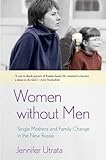Women without Men : Single Mothers and Family Change in the New Russia / Jennifer Utrata.
Material type: TextPublisher: Ithaca, NY : Cornell University Press, [2015]Copyright date: ©2015Description: 1 online resource (288 p.) : 8 halftonesContent type:
TextPublisher: Ithaca, NY : Cornell University Press, [2015]Copyright date: ©2015Description: 1 online resource (288 p.) : 8 halftonesContent type: - 9780801455728
- Families -- Russia (Federation)
- Post-communism -- Social aspects -- Russia (Federation)
- Sex role -- Russia (Federation)
- Single mothers -- Russia (Federation)
- Family & Relationships
- Sociology & Social Science
- Soviet & East European History
- SOCIAL SCIENCE / Sociology / Marriage & Family
- Feminist literature, single motherhood, Russian social issues, Social conflict, Social hierarchy, cultural ideals, matrifocal family
- 306.874/320947 23
- online - DeGruyter
| Item type | Current library | Call number | URL | Status | Notes | Barcode | |
|---|---|---|---|---|---|---|---|
 eBook
eBook
|
Biblioteca "Angelicum" Pont. Univ. S.Tommaso d'Aquino Nuvola online | online - DeGruyter (Browse shelf(Opens below)) | Online access | Not for loan (Accesso limitato) | Accesso per gli utenti autorizzati / Access for authorized users | (dgr)9780801455728 |
Frontmatter -- Contents -- Acknowledgments -- Note on Transliteration and Subjects -- Introduction -- Chapter 1. From State Protections to Post-Socialist “Freedoms” -- Chapter 2. Diminishing Material Difficulties -- Chapter 3. “Where The Women Are Strong” -- Chapter 4. It Takes A Babushka -- Chapter 5. Blurred Boundaries -- Chapter 6. Marginalized Men -- Conclusion. Normalized Gender Crisis -- Notes -- Bibliography -- Index
restricted access online access with authorization star
http://purl.org/coar/access_right/c_16ec
Women without Men illuminates Russia’s "quiet revolution" in family life through the lens of single motherhood. Drawing on extensive ethnographic and interview data, Jennifer Utrata focuses on the puzzle of how single motherhood—frequently seen as a social problem in other contexts—became taken for granted in the New Russia. While most Russians, including single mothers, believe that two-parent families are preferable, many also contend that single motherhood is an inevitable by-product of two intractable problems: "weak men" (reflected, they argue, in the country’s widespread, chronic male alcoholism) and a "weak state" (considered so because of Russia’s unequal economy and poor social services). Among the daily struggles to get by and get ahead, single motherhood, Utrata finds, is seldom considered a tragedy. Utrata begins by tracing the history of the cultural category of "single mother," from the state policies that created this category after World War II, through the demographic trends that contributed to rising rates of single motherhood, to the contemporary tension between the cultural ideal of the two-parent family and the de facto predominance of the matrifocal family. Providing a vivid narrative of the experiences not only of single mothers themselves but also of the grandmothers, other family members, and nonresident fathers who play roles in their lives, Women without Men maps the Russian family against the country’s profound postwar social disruptions and dislocations.
Mode of access: Internet via World Wide Web.
In English.
Description based on online resource; title from PDF title page (publisher's Web site, viewed 26. Apr 2024)


